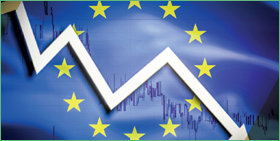Eurozone economic slowdown: Evidence from Coface’s activity indicators

Since the start of 2019, the signals warning of a slowdown in world growth have multiplied. While all economists agree on this downward trend, following the cyclical peak reached in 2017, there is now a question mark as to the scale of this slowdown, especially in the eurozone. While some commentators are suggesting the likelihood of a recession in 2020, most economists are predicting “only” a slight downturn.
In this period of high uncertainty, forecasting growth is even more difficult and important, which is why Coface has decided to develop its own forecasting tool: the CRAFT (Coface Research Activity Forecasting Tool), which we present in this publication.
This activity indicator is constructed using the statistical method known as Principal Component Analysis (PCA), which enables Coface to extract common signals transmitted by a large number of variables by reducing them to “common factors” or principal components. The variables most likely to affect economic activity are selected via machine learning models. The variables retained - between thirty and fifty for each country - can be grouped into four distinct categories: hard data, survey data, monetary and financial variables, and international indicators. To these four types of variable commonly used for the construction of activity indicators, Coface has added the company default rate on trade receivables insured by Coface aggregated by country. Due to the way it is constructed, CRAFT is strongly correlated with the quarterly GDP growth rate and allows GDP to be correctly projected for the current quarter (nowcasting) and for the next quarter (forecasting).
According to the results of this model, Germany will enter recession in the 3rd quarter (-0.1% after -0.1% already in the previous quarter), before stagnating in the last three months of the year. The French economy will continue to show resilience, but will also slow in the 3rd quarter (+0.2%) before rebounding at the end of the year (+0.3%). Conversely, growth will pick up again in Spain in the 3rd quarter (+0.6%)
before slowing slightly (+0.5%), while nonetheless remaining solid. Finally, activity will remain sluggish in Italy: after a modest rebound in the 3rd quarter at 0.1%, it will again stagnate in the 4th quarter.


